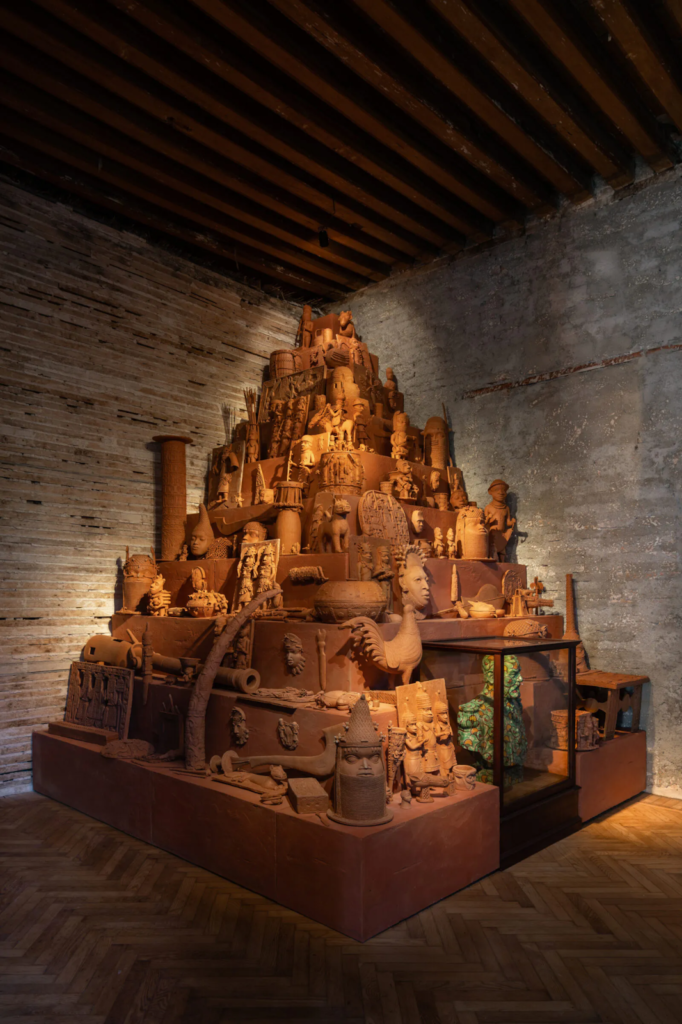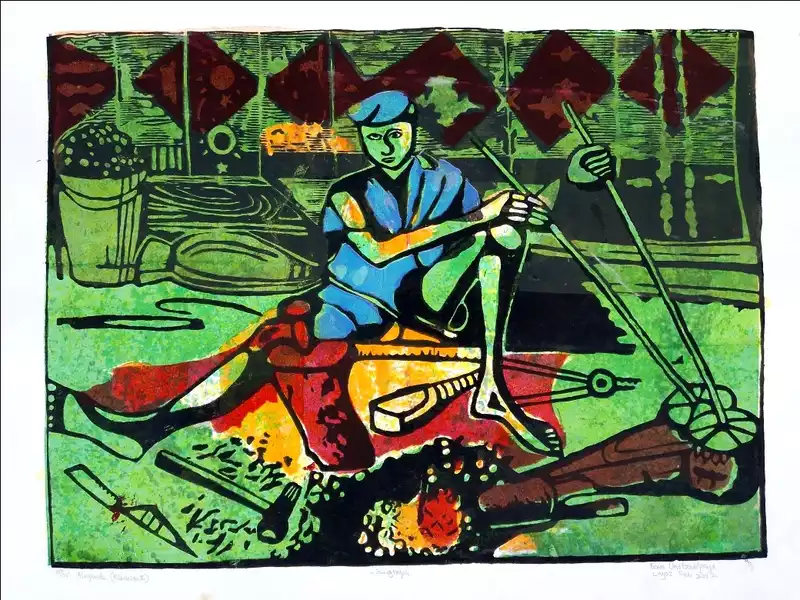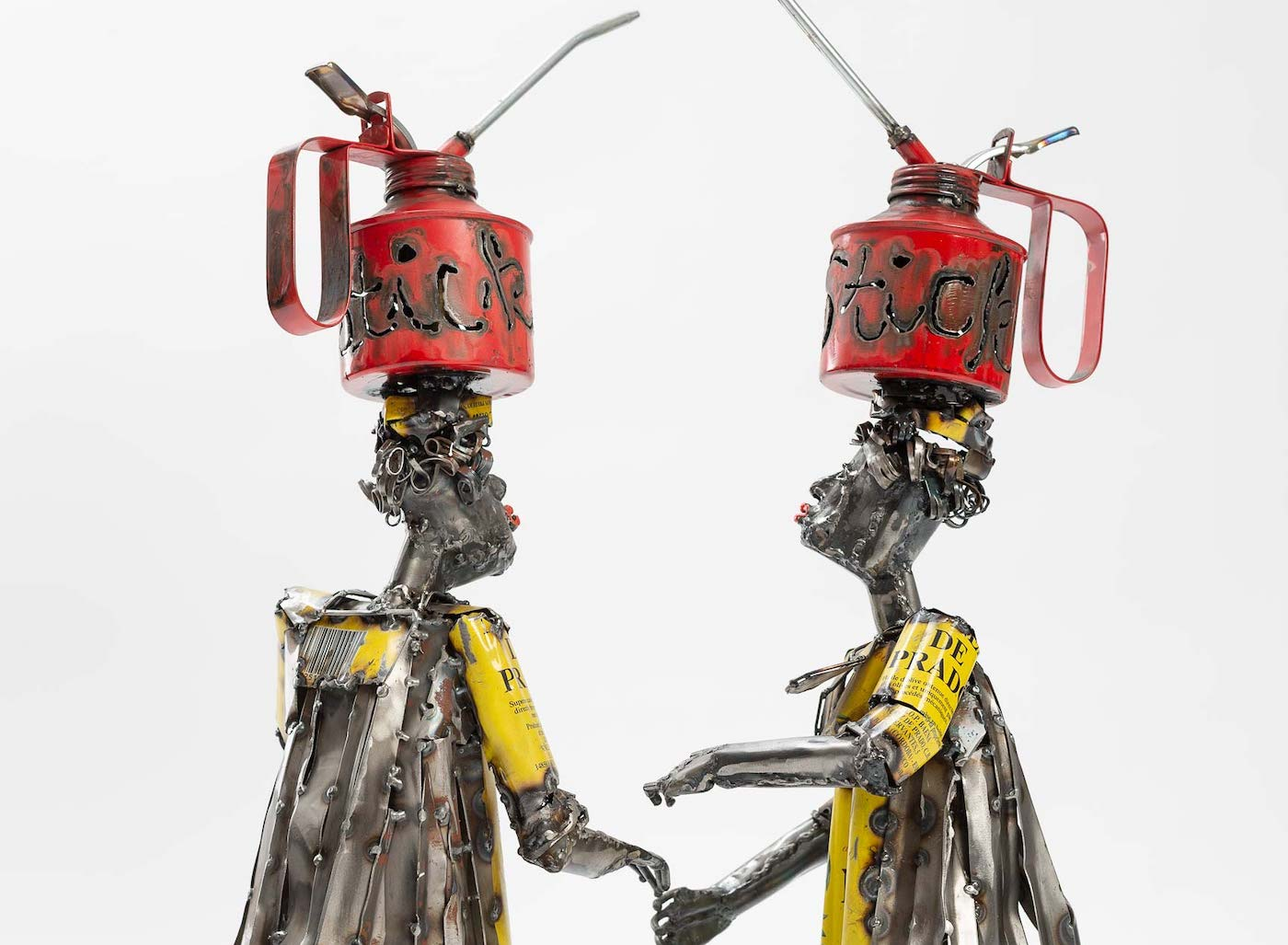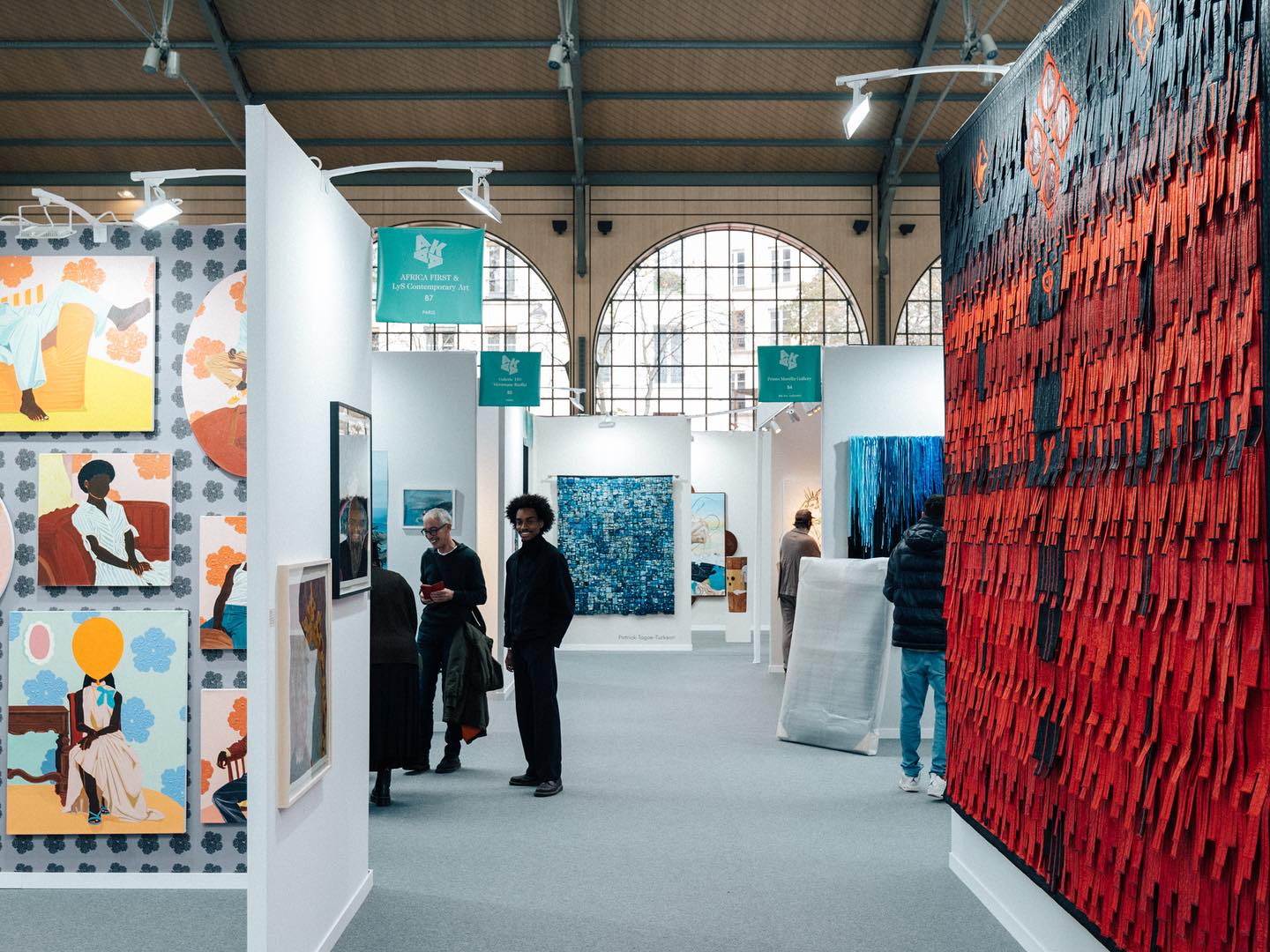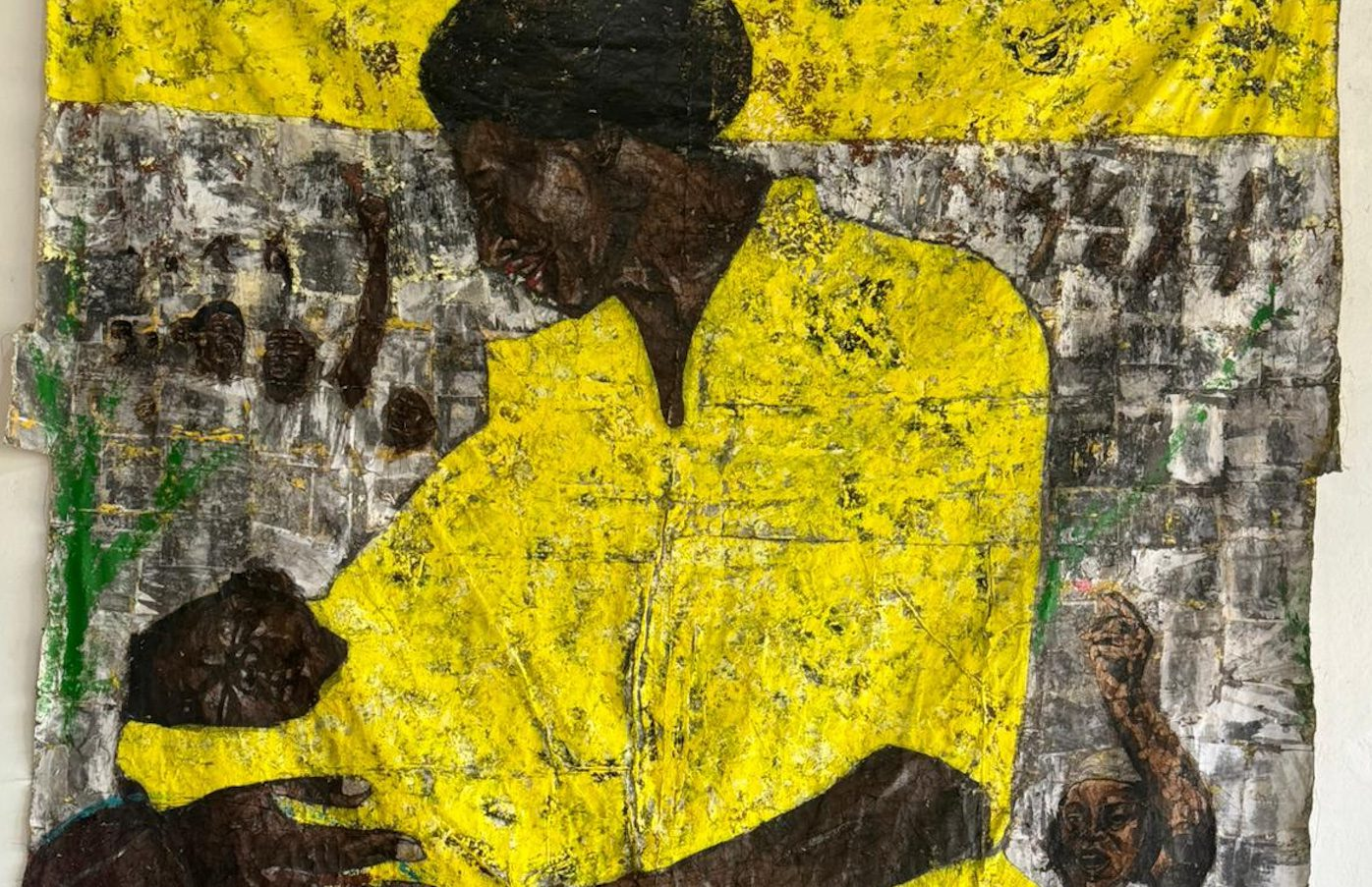The 2024 Venice Biennale is still on! This year’s edition of the Venice Biennale marks the largest-ever participation by African countries in its 129-year history. Compared to the number of African national pavilions presented in 2022, which was only 9 in number, 13 African countries presented official National pavilions this year. Although 15 African countries were scheduled to participate, the Kenyan and Moroccan pavilions were canceled for various last-minute reasons.
Titled ‘Foreigners Everywhere’, the exhibition was curated by Adriano Pedrosa, director of the São Paulo Museum of Art, and it features 331 artists and collectives exploring living on the margins as an outsider.
In Eric Otieno Sumba’s essay, ‘What Is Africa’s Role at the Venice Biennale?’ published in Frieze, he opines that “As a means of asserting any kind of meaningful African presence at the world’s oldest contemporary art biennial, the concept of ‘Africa in Venice’ is mostly a delusion. Africa is emphatically not in Venice – not as the fictional ‘country’ it is still often misunderstood to be, and certainly not as a sum of its 55 constituent nations – but the lack of representation is by no means absolute. Every few years, curators will (re)discover that African countries are direly underrepresented and launch a well-meaning effort to salvage the situation, usually by scouring their networks to find a few fine contributions to the main exhibition.” In an essay published in Frieze, Sean Burns observes that: “The principal shortcoming of ‘Foreigners Everywhere’ is that it aims to unite a set of unique experiences under the rubric of ‘outsider’, as though artists who are queer, Indigenous, self-taught and/or from the Global South are somehow all the same. That said, the show features some fascinating works.”
That said, the show features some fascinating pavilions. Here are three of the National Pavilions we found fascinating:
The Benin Pavilion
The inaugural national pavilion of the Republic of Benin at the 60th edition of the Venice Biennale Nationale was curated by Azu Nwagbogu. Assisted by Yassine Lassissi, artistic director of Lagos’s La Galerie Nationale du Bénin, and architect Franck Houndégla, the pavilion was commissioned by José Pliya, playwright and general director of La Galerie. This participation shows Benin’s commitment to actively promoting its artistic and cultural scene.
Titled ‘Everything Precious Is Fragile’, the exhibition showcases works from Chloé Quenum, Moufouli Bello, Ishola Akpo, and Romuald Hazoumè. Everything Precious Is Fragile emanates from a deep exploration of Yoruba Gė lė dė traditions, addressing the contemporary world’s fragility marked by ecological challenges, conflicts, and social inequalities. In collaboration with Benin’s traditional rulers, the curatorial team shaped the pavilion’s concept, humbly embracing fragility and the ephemeral nature of existence — for humans, plants, and animals. Gė lė dė philosophy unveils ecological, political, cultural, and social dimensions, celebrating indigenous wisdom’s resurgence and highlighting women’s vital role.
Hazoumè, Quenum, Akpo, and Bello embody Beninese ethos, advocating regeneration and [re]matriation, the return to the mother. Benin’s historical legacy and recent restitution of cultural artifacts shape the exhibition. The pavilion envisions a compassionate future and challenges perceptions of fragility and strength. The Arsenale’s pavilion includes a library on colonial legacy, Indigenous knowledge, African representation, and biodiversity loss. It proposes urgent questions on the material and philosophical nature of fragility. Is fragility a strength or a weakness?
The Nigerian Pavilion
This is Nigeria’s second participation at the Venice Biennale. Curated by Aindrea Emelife, curator of Modern and Contemporary Art at MOWAA, the Museum of West African Art in Benin City, Nigeria, pavilion features works by a cross-generational group of artists including Tunji Adeniyi-Jones, Ndidi Dike, Onyeka Igwe, Toyin Ojih Odutola, Abraham Oghobase, Precious Okoyomon, Yinka Shonibare CBE RA, and Fatimah Tuggar. Titled ‘Nigeria Imaginary’, the exhibition features only commissioned, site-specific pieces installations.
Nigeria Imaginary explores the role of both great moments in Nigeria’s history – moments of optimism – and the Nigeria of the mind—a Nigeria that could be and is yet to be. Presenting different perspectives and constructed ideas, memories, and nostalgias of Nigeria, Nigeria Imaginary leverages an intergenerational and diasporic lens to imagine a Nigeria for the future. These voices are articulated via diverse mediums, from painting, photography, and sculpture, to AR, sound, and film.
Yinka Shonibare CBE RA explores the Benin Expedition of 1897 and presents a new way to understand the looted objects, whereas Toyin Ojih Odutola reimagines a new world centered around the Mbari House. Onyeka Igwe and Abraham O. Oghobase explore the colonial hangover and question the future of this legacy whilst Tunji Adeniyi-Jones looks to the history of Nigerian modernism to evoke an alternative art-historical future. Fatimah Tuggar presents a utopic vision for a new Nigeria and Ndidi Dike assesses the intersection between the 2020 EndSARS protests in Nigeria and the global movement of Black Lives Matter. Finally, Precious Okoyomon invites us into a dream state, placing us into the minds and perspectives of contemporary Nigerians so we can reimagine Nigeria with them.
The South-African Pavilion
Curated by Portia Malatjie, the 2024 South African Pavilion at La Biennale di Venezia is titled ‘Quiet Ground’, and features a newly commissioned sound installation, Dinokana (2024) by the collective, MADEYOULOOK – Molemo Moiloa and Nare Mokgotho.
The sound installation, Dinokana (2024) explores themes of land and water displacement, sovereignty, and rehabilitation. Focusing on perennial strategies of repairing severed relationships to the land, the artists consider the symbolism of the resurrection plant, which, in apparent death, reanimates upon receiving water to draw attention to how two communities in the north of South Africa have approached cycles of loss and repair. MADEYOULOOK signals various histories that have controlled how Black and Indigenous peoples access their surroundings to examine the instrumentalization of natural resources as forms of capture and alienation.
MADEYOULOOK contemplates the political and social capacity of water and draws on it as an infrastructure of repair. The immersive multi-channel installation marries sound comprising traditional songs about rain, harvest, and water divination with snippets of interviews with growers and land-workers from different generations and communities to consider the cyclical and insistent cross-generational forms of reconstitution.
Visitors are invited to inhabit the installation as a sanctuary of rest and refuge.
Dinokana runs on a 30-minute interval, with 20 minutes of sonic activity, followed by a 10-minute intermission.
Iyanuoluwa Adenle is a Nigerian art writer, essayist, and poet based in Lagos. She is currently the head writer at Omenai. Adenle has contributed to a number of art publications, including Tender Photo, Art News Africa, Pavillon 54, and Omenai.

